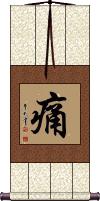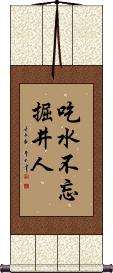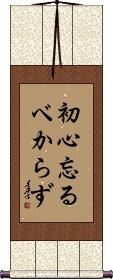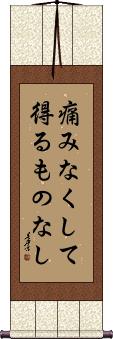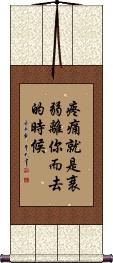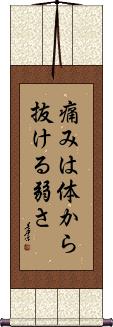Many custom options...
And formats...

Not what you want?
Try other similar-meaning words, fewer words, or just one word.
Pain Forget in Chinese / Japanese...
Buy a Pain Forget calligraphy wall scroll here!
Personalize your custom “Pain Forget” project by clicking the button next to your favorite “Pain Forget” title below...
Switched to secondary search mode due to lack of results using primary.
These secondary results may not be very accurate. Try a different but similar meaning word or phrase for better results. Or...
Look up Pain Forget in my Japanese Kanji & Chinese Character Dictionary(My dictionary is a different system then the calligraphy search you just tried)
If you want a special phrase, word, title, name, or proverb, feel free to contact me, and I will translate your custom calligraphy idea for you.
1. Pain
2. Drinking the water of a well: One should never forget who dug it
4. Never Forget Your First Resolution
5. Never Forget
7. The Pain of Love / Love Troubles
8. The Pain of Separation from Your Loves
9. Pain is Weakness Leaving the Body
10. There is no pleasure without pain
11. Never Forget
Pain
ache / sorrow
痛 means pain in Chinese and old Korean Hanja. It also means pain/hurt/bruise in Japanese but is seldom seen as a single Kanji (usually, at least a Hiragana is added to make the word “itai” which is what a Japanese person will scream when they are in pain).
Depending on the context, this word can mean hurt, ache, sorrow, or refer to damage to a human body. As a single character, the possible meanings are very open - so you can decide what it means to you, as long as the general meaning is still “painful.”
See Also: Hurt
Drinking the water of a well: One should never forget who dug it
This proverb suggests that one should always be grateful to those who helped one succeed.
And remember your ancestors and those that came before you whose sacrifices made your present life better.
Some Chinese will separate the intended meaning from this proverb and translate this as “Don't forget the people who once helped you.” In Modern China, this idiom is virtually never used to refer to an actual well.
Note: This can be pronounced in Korean but it's not a commonly used phrase.
Forgive and Forget
略跡原情 is a Chinese proverb that means “to overlook past faults,” or “forgive and forget.”
It's more literally, “Abridge or make small the scars from your past emotions.” You should let it go.
The character breakdown:
略 (lüè) abbreviation; omission; abridge.
跡 (jī) ruins; scar; traces.
原 (yuán) former.
情 (qíng) feeling; emotion.
Forgive and Forget
Confucian Proverb
不念舊惡 is a Chinese proverb that can be translated as “Do not recall old grievances,” or more simply as “Forgive and forget.”
The character breakdown:
不 (bù) not; no; don't.
念 (niàn) read aloud.
舊 (jiù) old; former.
惡 (è) wicked deeds; grievances; sins.
This proverb comes from the Analects of Confucius.
Forgive and Forget
Water Under the Bridge
水に流す is a Japanese proverb that suggests that “water continues to flow.”
It's similar to our English phrase, “Water under the bridge.” The perceived meaning is, “Forgive and forget.”
I have also seen this translated as “Don't cry over spilled milk.”
Note: Because this selection contains some special Japanese Hiragana characters, it should be written by a Japanese calligrapher.
Never Forget Your First Resolution
Never Lose Your Beginner's Spirit
初心忘るべからず is an old Japanese proverb that suggests you try to never forget the enthusiasm you had as a child when you try new things (or even face the day-to-day). Basically, avoid having the mundane attitude that many people get with age.
You'll find this Japanese proverb translated in a few different ways. Here are some of them:
Don't forget your first resolution.
Never forget your childlike enthusiasm.
Forget not the beginner's mind.
Try never to lose your initial enthusiasm (freshness of attitude).
Note: This is sometimes written as 初心忘る可からず. The one shown above is used about 10x more often. There’s only one character difference between the two versions.
Note: Because this selection contains some special Japanese Hiragana characters, it should be written by a Japanese calligrapher.
Never Forget
Never forget your vow or path
No Pain No Gain
Literally: No Pain, No Strength
No Pain No Gain
痛みなくして得るものなし is a Japanese phrase that means “no pain, no gain.”
This suggests that with pain, a gain must follow.
The pain Kanji here can also be translated as sorrow or suffering. The gain can also mean profit, advantage, or benefit. In the Japanese Buddhist context, that gain Kanji can mean rebirth in paradise, entering nirvana.
The character breakdown:
痛みなく (itami naku) pain; ache; sore; grief; distress. The naku part adds the meaning of “a lot of” or “extended”
して (shite) and then. (indicates a causative expression; acts as a connective particle)
得る (eru) to get; to acquire; to obtain; to procure; to earn; to win; to gain; to secure; to attain.
もの (mono) conjunctive particle indicating a cause or reason.
なし (nashi) none of; -less; without; no.
Note: Because this selection contains some special Japanese Hiragana characters, it should be written by a Japanese calligrapher.
The Pain of Love / Love Troubles
The Pain of Separation from Your Loves
愛別離苦 is a Buddhist term that refers to “the pain of separation from loved ones,” or “the suffering of being separated from those whom one loves.”
If you translate each character separately, you get, “love(s) separated [and] departed [yields] pain.”
The pain character can also be defined as anguish; suffering; distress; anxiety; worry; trouble; difficulty; hardship; bitterness; to suffer; anguish; distress; anxiety; worry; trouble; difficulty; bitterness; unhappiness; or misery.
Pain is Weakness Leaving the Body
I remember this being shouted a lot during U.S. Marine Corps boot camp. 疼痛就是衰弱離你而去的時候 is how to write that phrase in Chinese. At least, this is as close as we could compose/translate it, and hold the full original meaning and connotations.
The version shown here is really, “Pain is weakness leaving your body.” Although it's said in English both ways (the or your), it works better in Chinese with “your.”
Pain is Weakness Leaving the Body
痛みは体から抜ける弱さ is how to write “pain is weakness leaving the body” in Japanese.
I remember this being shouted a lot during U.S. Marine Corps boot camp.
Note: Because this selection contains some special Japanese Hiragana characters, it should be written by a Japanese calligrapher.
There is no pleasure without pain
No pain, no gain
Never Forget
The following table may be helpful for those studying Chinese or Japanese...
| Title | Characters | Romaji (Romanized Japanese) | Various forms of Romanized Chinese | |
| Pain | 痛 | tsuu / ita / tsu / ita | tòng / tong4 / tong | t`ung / tung |
| Drinking the water of a well: One should never forget who dug it | 吃水不忘掘井人 | chī shuǐ bú wàng jué jǐng rén chi1 shui3 bu2 wang4 jue2 jing3 ren2 chi shui bu wang jue jing ren chishuibuwangjuejingren | ch`ih shui pu wang chüeh ching jen chih shui pu wang chüeh ching jen |
|
| Forgive and Forget | 略跡原情 略迹原情 | lüè jì yuán qíng lve4 ji4 yuan2 qing2 lve ji yuan qing lvejiyuanqing | chi yüan ch`ing chiyüanching chi yüan ching |
|
| Forgive and Forget | 不念舊惡 不念旧恶 | bú niàn jiù è bu2 nian4 jiu4 e4 bu nian jiu e bunianjiue | pu nien chiu o punienchiuo |
|
| Forgive and Forget | 水に流す | mizu ni naga su mizuninagasu | ||
| Never Forget Your First Resolution | 初心忘るべからず / 初心忘る可からず 初心忘るべからず | sho shin wasu ru be ka ra zu shoshinwasurubekarazu | ||
| Never Forget | 常不忘失 | jou fu bou shitsu joufuboushitsu jo fu bo shitsu | cháng bú wàng shī chang2 bu2 wang4 shi1 chang bu wang shi changbuwangshi | ch`ang pu wang shih changpuwangshih chang pu wang shih |
| No Pain No Gain | 不痛不強 不痛不强 | bú tòng bù qiáng bu2 tong4 bu4 qiang2 bu tong bu qiang butongbuqiang | pu t`ung pu ch`iang putungpuchiang pu tung pu chiang |
|
| No Pain No Gain | 痛みなくして得るものなし | itami naku shite erumono wa nashi | ||
| The Pain of Love Love Troubles | 戀の悩み 恋の悩み | koinonayami | ||
| The Pain of Separation from Your Loves | 愛別離苦 爱别离苦 | ai betsu ri ku aibetsuriku | ài bié lí kǔ ai4 bie2 li2 ku3 ai bie li ku aibieliku | ai pieh li k`u aipiehliku ai pieh li ku |
| Pain is Weakness Leaving the Body | 疼痛就是衰弱離你而去的時候 疼痛就是衰弱离你而去的时候 | téng tòng jiù shì shuāi ruò lí nǐ ér qù de shí hòu teng2 tong4 jiu4 shi4 shuai1 ruo4 li2 ni3 er2 qu4 de shi2 hou4 teng tong jiu shi shuai ruo li ni er qu de shi hou | t`eng t`ung chiu shih shuai jo li ni erh ch`ü te shih hou teng tung chiu shih shuai jo li ni erh chü te shih hou |
|
| Pain is Weakness Leaving the Body | 痛みは體から抜ける弱さ 痛みは体から抜ける弱さ | itami wa karada kara nukeru yowasa | ||
| There is no pleasure without pain | 苦は楽の種 | ku wa raku no tane kuwarakunotane | ||
| Never Forget | 永志不忘 | yǒng zhì bù wàng yong3 zhi4 bu4 wang4 yong zhi bu wang yongzhibuwang | yung chih pu wang yungchihpuwang |
|
| In some entries above you will see that characters have different versions above and below a line. In these cases, the characters above the line are Traditional Chinese, while the ones below are Simplified Chinese. | ||||
Successful Chinese Character and Japanese Kanji calligraphy searches within the last few hours...
